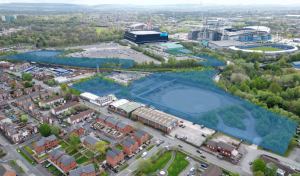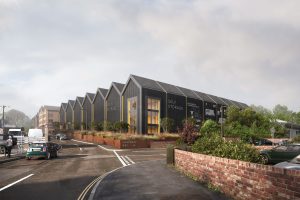Property Focus – The Interview – Anita Gupta
.jpg)
IN our series of interviews with top professionals from across the property sector, TheBusinessDesk catches up with Anita Gupta, partner in the real estate team at DWF in Manchester.
What are your views of the current state of the commercial property and property development markets?
We all recall with a shudder how the market virtually dried up overnight in the summer and autumn of 2008, and the aftershocks of the banking crisis continue to reverberate round the market. The good news is the cranes are back on the horizon! However, their appearance is sporadic.
There was a fragile confidence from summer 2009 until the general election this year, where we have voted to deal with our financial problems by cutting our spending. This has resulted in increased nervousness whilst the impact of the Comprehensive Spending Review is digested. No one knows whether the cuts will work, or whether Labour’s policy of spending our way out of a recession would be any better, but the fact remains that cuts hurt, banks are not in a position to lend as they did previously and we need to adjust to a new way of doing business. Local authorities and other public sector bodies will need to lead the way on many projects, but their funding streams are uncertain and much reduced. Therefore a cash buyer who is willing to take a pragmatic view can take advantage of the market.
Development is much less prevalent now, but we have seen some forward funding schemes for supermarkets, where there is an agreement for lease with a supermarket, and the investment is sold in advance to a fund, before the scheme is built out. Longer term schemes will continue, albeit at a slower pace. We will start to see more renewable energy projects over the next couple of years – that is one of the few areas where we are likely to see significant growth as we work our way through this recession.
What key challenges and pieces of legislation do you think will most affect your sector over the coming months?
The banks still have a lot of bad debt that they don’t know what to do with. We will continue to see either formal insolvencies or bank driven sales. The increase in VAT to 20% will have a significant cash flow impact on businesses which can recover VAT, or result in increased cost to those businesses who cannot recover VAT. Most land transactions attract VAT and stamp duty land tax is also paid on the VAT inclusive premium or rents. This will result in downward pressure on prices and rents.
On the positive side, legislation such as the feed in tariffs (to encourage the generation of renewable energy by householders and small businesses) combined with the need to source 15% of our energy needs from renewable sources by 2020 will result in a drive into the renewables business.
Why do you think the North West is a good place to do business?
The North West is a vibrant and entrepreneurial region. It knows how to make the best of its assets, with events like the Manchester Commonwealth Games 2002 and Liverpool’s European capital of culture 2008 leaving a lasting legacy for the benefit of the region. Unlike the south east, the region’s major cities do not suck dry a lot of the commercial activity in the smaller towns and cities, with continued activity in Lancashire and Cheshire. Concepts such as the emerging Liverpool City Region also demonstrate how a city’s success can benefit its immediate surroundings. And of course, I love the warmth and humour of the people from the region.
What is your favourite building in the North West and why?
The Free Trade Hall in Manchester, which is now a five star Radisson Hotel. I like
If you could improve anything in the region, what would it be?
Whilst the public transport system in some parts of our region, like Manchester, is good, we are lacking a truly integrated public transport system in the North West. If you travel to somewhere like Berlin, the public transport system is amazing and helps mobilise the entire population as you can hop on and off buses, trams and trains to travel easily and cheaply throughout the city – and that means not just in and out of the city centre, but around the whole region. Even when funding was less of an issue, we have dabbled at the edges. Improved transport infrastructure is essential to help revitalise the economy – and implementing it will also result in jobs encourage us all to stop using our cars.
What was your first job and how did you enter your current line of work?
My first job was playing the piano for children’s ballet classes – much warmer, more fun and lucrative than a paper round! I studied law, and trained to be a solicitor. I was surprised at finding myself qualifying into real estate, as land law and conveyancing were the dullest subjects at law school. However, they were far more interesting in practice, and the subjects that were interesting to study did not do it for me in the real world – I am not cut out to deal with divorces or catastrophic injuries.
What do you most enjoy about your job?
Commercial real estate can be surprisingly creative, particularly when we are involved in development projects. You have a number of parties who usually want the same outcome, but come at it with different perspectives. Moving away from run of the mill transactions means you need to carefully structure the contractual documentation and be innovative in finding a sound solution. I enjoy being seen as part of my client’s team in giving commercial advice, based on my knowledge of the law. Nothing is worse than being viewed as the lawyer sat in the ivory tower that gets in the way, but if clients involve us from the outset as an integral part of their team of advisers, we can truly add value, and that gives me a real buzz.
What barriers have you faced during your career and how have you overcome them?
I am lucky enough to look younger than my age, but in the real estate world, that can actually be an extra obstacle, where people assume that the experience and quality of advice increases proportionately with the number of grey hairs. This can be overcome by demonstrating your skill, and I certainly don’t intend to dye my hair grey!
What is the best piece of advice you’ve ever been given?
Life is not a dress rehearsal.
And the worst?
I was advised to learn about football so I could talk with the boys. This developed into a genuine enjoyment of the game. Whilst I was working in Leeds, I started to follow Leeds United and have been a fan for 13 years. Some would say the timing of the advice was bad, as supporting Leeds has definitely not been good for my blood pressure!








